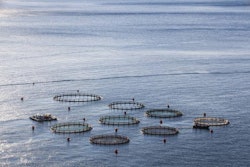Series offers insights on challenges facing piglets in first week of life
Animal health and nutrition company, Tonisity held a series of webinars explaining challenges faced by young piglets in the first week of life. The webinars which were presented by Mathieu Cortyl, managing director for Tonisity Europe and Asia Pacific, gave several insights into challenges facing piglet pre-weaning.
It is commonly known that piglets are born with an immature intestine and the trend for increased litter size results in reduced weight at birth, increased pre-weaning mortality, reduced lifetime performance and a longer time to reach target weight. All this impacts on producers’ economic performance. Mr. Cortyl explained how thanks to genetic improvements, “on average, sows give birth to an extra 0.2 to 0.3 piglet per litter every year”. He expanded on the effects of the increased litter sizes to highlight studies focusing on consequences of increased litter sizes.
For instance, longer farrowing can lead to increased risk of asphyxiation. The birthweight of pigs is a key area the company have explored and revealed some interesting findings. The average birthweight of piglets is reduced in large litters. For each piglet born, bodyweight is reduced by 40g per pig on average. The number of smaller piglets is also increased. Lower birthweight pigs are shown to have lesser developed intestines, which has an impact on their feed efficiency, leading to reduced performance.
Cortyl described how pre-weaning mortality is a major problem for producers. “80% of pre-weaning mortality happens in the first week of a pig’s life, 40% of that is in the first 24 hours of life and the next 40% happens between days two to seven.” Interestingly, Cortyl explained that it is not just light birthweight pigs that are lost pre-weaning. “90% of pigs born weigh more than 1kg at birth. Therefore, most piglets lost pre-weaning weigh more than 1kg at birth. It is a common misconception that it is just the lighter pigs that fail to make it to weaning. 60-80% of piglets who die before weaning are considered good piglets at birth.”
The second webinar also highlighted solutions for early intervention in the first week of a piglet’s life. Producers and veterinarians face many challenges in pig production. But it all starts with the birth of the piglet. “We must ask ourselves is there anything we can do to change or improve that first week, that will improve the pig’s survival and improve our production outcomes,” Cortyl states.
Piglets are born with an underdeveloped small intestine. The number of intestinal cells have the potential to double in the first three days, and at three weeks there is potential for two to three times more length and surface area. The small intestine is lined with villi which greatly increase the surface area. On these villi are enterocytes, which cover about 80% of the cells which are on the surface of the villi. The function of these enterocytes is to absorb nutrients into the bloodstream.
By focussing on micro-enteral nutrition, the delivery of small amounts of water, electrolytes, and readily absorbed nutrients directly to the gastro-intestinal tract, you can directly feed the enterocytes. If you feed the intestinal cells, the integrity of the intestinal barrier is also maintained which is key to maintaining gut health. This has many benefits for young piglets including supporting gut development in early life, resulting in better absorption of nutrients from sows’ milk. This helps reduce the risk of diarrhea, decreases pre-weaning mortality and lays the foundation for increased weights up to the finisher stage.
Tonisity offered their solution for early intervention, Tonisity Px (Px), the first isotonic protein drink for pigs which can be given to pigs from day two to eight and at weaning. Px directly feeds the enterocytes and has been proven in 139 trials in 31 countries on 168,553 pigs. Mr. Cortyl also introduced Tonisity PxW WeanBetter, a new concentrated, water-soluble solution to increase water intake and support the gut after weaning. Initial trials show an increase of water intake by three times that of the control, leading to a 68% reduction in fall behinds after three weeks post arrival.
To view the webinar recordings, visit https://tonisity.com/blog/.









